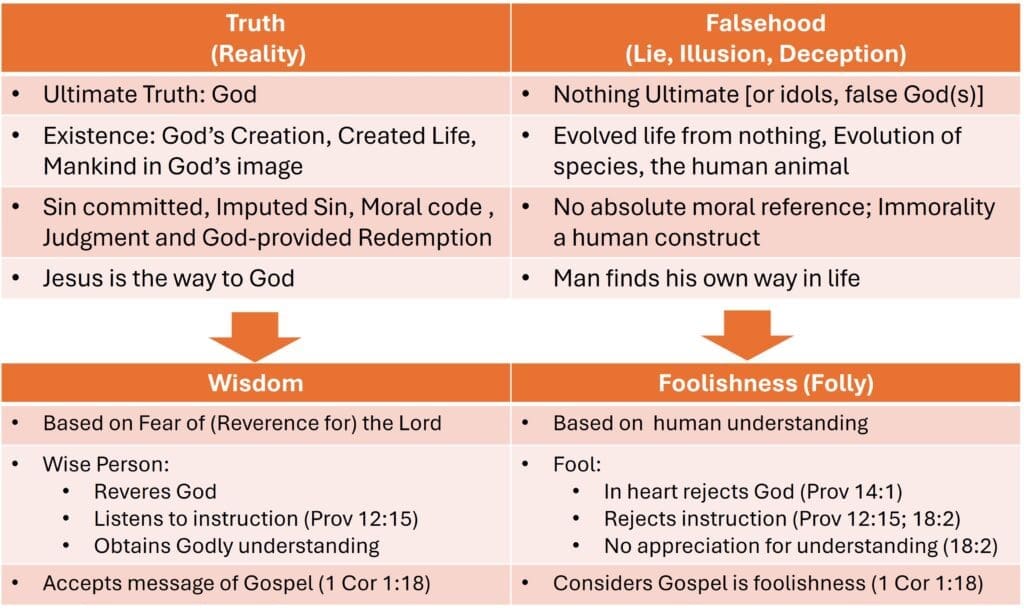Wisdom Wednesday :Wisdom and Truth Part 3
Truth and Falsehood, Wisdom and Foolishness
Submitted by Debbie’s Dad
“The fear of the LORD is the beginning of knowledge;
Fools despise wisdom and instruction.” (Proverbs 1:7) NASB 95
In this series we have examined the relationship between truth (the reality of the Person of God) and wisdom, the practice of living to follow and glorify (reveal) Him. Last week we saw we may seek God’s gift of wisdom, so we may have the knowledge to truly know Him (have a genuine relationship with Him), and the understanding necessary to live our lives to walk with Him daily, making decisions in His will.
Truth about ultimate reality is knowledge provided by God, and understanding is the ability to apply that knowledge so we can walk daily with God. Now, we consider the alternative to truth – the ultimate reality of the Creator God, His Son Jesus Christ, and the Spirit of God.
The opposite of truth is falsehood. In opposition to the Person of God the Creator is His opponent, Satan. Falsehoods include false concepts (mischaracterizations, lies, illusions, and deceptions) that assert anything other than the God of creation. These falsehoods include:
- Nothing – The materialist asserts that there is no God; all existence is material and came from nothing. This is all there is, ever was, and all there ever will be.
- Only Existence – The existentialist claims that since there is no God, there is no meaning, and existence takes precedence over essence of human nature – and we are totally free of purpose and moral responsibility. This leads to the view that life is absurd.
- False religions – assert the existence of a false alternative god or gods and deny the Creator God revealed in the Scripture. There are many forms: Polytheism (many gods), Pantheism (god is identified with the world) Panentheism (god is within the world and identified with it), Deism (transcendent god, but no intervention in world) and Theism (personal infinite god is beyond the world but acts within it).
The distinction between Truth and Falsehood is contrasted in the chart below. The chart also illustrates how Truth leads to Godly wisdom and falsehood leads to foolishness (or folly). These results are descriptions of ways of life: the wise person in contrast with the fool. Here are the characteristics, according to Scripture:
- The wise person acknowledges and fears (reveres) the Lord and listens to instruction revealed in the Scripture (Prov 12:15). From this instruction, the wise obtains Godly understanding. And the wise accepts the message of Gospel (1 Cor 1:18)
- The fool rejects God in the heart (Prov 14:1) and rejects the instruction of Scripture (Prov 12:15; 18:2). The test fool rejects instruction and has no appreciation for understanding (18:2). Furthermore, the fool considers the Gospel message of Christ’s redemption to be foolishness (1 Cor 1:18)

Is there hope for those who have adopted falsehoods and reject the Creator God? Of course! There is hope that we may turn around from the false and turn to the truth (the Bible uses the word repent (metanoia in the Greek- a change of mind and purpose and life).
In the Old Testament several familiar cases of people turning from their foolishness to the truth, include:
- Jonah was sent to warn the Assyrian capital city of Nineveh of impending judgment because of their idolatrous foolishness. The king and people fasted, wore sackcloth, and repented from their evil ways, and God relented from destroying the city because of their genuine repentance (Jonah 3:5–10).
- After years of foolish idolatry and oppression by the Philistines, the Israelites sought Samuel’s help at Mizpah (1 Samuel 7). They fasted, confessed their sins, repented and destroyed their idols. Then God gave them victory over the Philistines and restored peace.
- Manasseh, a King of Judah foolishly led the people into idolatry and bloodshed (2 Chronicles 33). After being taken captive by the Assyrians, he humbled himself, repented and prayed to God. God restored him to his kingdom, and Manasseh removed foreign gods and repaired the altar.
- Nehemiah and Ezra led the Israelites out of exile in Babylon to return to Jerusalem, where they gathered to confess their foolishness – their own sins and the sins of their ancestors. They fasted, read the Law, and made a commitment to obey God. (Nehemiah 9)
Similarly in the New Testament, we have people who recognized the truth and turned from foolishness:
- Two foolish criminals were crucified, one on each side of Jesus. (Luke 23:39-43) One criminal insulted Jesus while dying, but the other repented while dying and acknowledged Jesus as king, saying. “Jesus, remember me when You come in Your kingdom!”. Because of his dying faith, Jesus assured him that he would join him in Paradise.
- On the day of Pentecost in Jerusalem, Peter preached about Jesus’ death and resurrection, and many were “cut to the heart.” About 3,000 people repented, were baptized, and received the Holy Spirit. (Acts 2)
- Saul was a devout religious, but foolish man who rejected the truth of Jesus as the Messiah. He persecuted those who believed in Jesus until Jesus Himself appeared to him on the road to Damascus. Blinded and humbled, Saul repented of his foolishness and was baptized, becoming the Apostle Paul. (Acts 9)
Let us all consider where there is foolishness in our lives that rejects the truth and turn our hearts around to fear-revere Jesus, the way the truth and the life. This is the way to wisdom and a walk with Him.